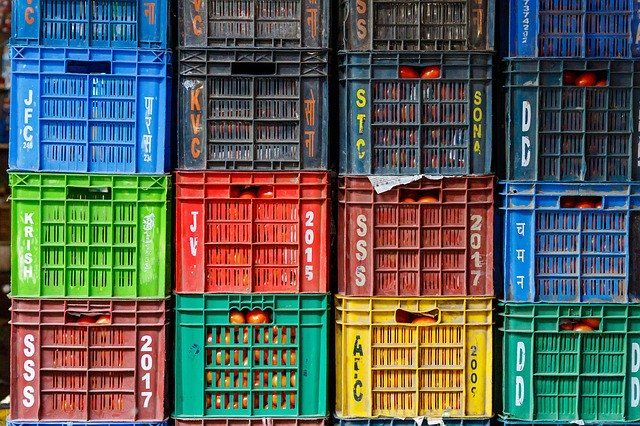It has been announced that the British Red Cross has partnered with the UK’s biggest food charity, FareShare, to help keep the country fed throughout the Covid-19 crisis and aftermath
Known best for helping those in crisis around the world, the British Red Cross has partnered with FareShare, the UK’s largest charity fighting food waste and hunger by redistributing food to frontline charities. Together, they will continue to provide emergency food parcels to vulnerable people across the UK during the current pandemic and aftermath.
The partnership is set to use FareShare’s existing food redistribution warehouses and country-wide network of 11,000 frontline charities, together with the British Red Cross’s crisis response volunteers, equipment, space, and resources, to significantly increase the amount of food that can be distributed to those in need.
I launched my campaign with @FareShareUK 8 weeks ago. Today, we are supplying 2.8million meals a week for vulnerable people across the UK. Meals they wouldn’t otherwise have. And you all deserve a HUGE thank you! (2)
— Marcus Rashford (@MarcusRashford) May 15, 2020
Currently, one in eight people in the UK struggle to access food. According to a strategic needs analysis by the British Red Cross of those already in or facing financial hardship in the UK, an estimated 10 million are in or face financial hardship, potentially making the need for food parcels that much more vital over the coming months.
Since lockdown began on March 23, demand for FareShare’s food has soared, seeing a 90% increase in the amount it has delivered to frontline charities. To help keep up with demand, FareShare has secured nine additional warehouse units across the UK.
Together, the two charities will continue to source food and create a delivery service that will see British Red Cross community reserve volunteers assisting with packing and delivering food parcels from local distribution hubs, directly to the doorsteps of vulnerable people. The partnership hopes to help those who urgently need food during the crisis and following months, as many more are expected to be under increased financial strain.
Nearly 1,400 British Red Cross community reserve volunteers so far have signed up to assist with sorting, packing, and delivering food to charities at FareShare’s 24 regional warehouses.
A massive thank you to @waitrose for this incredible delivery to FareShare South Midlands - the equivalent of 10,000 meals! 👏 pic.twitter.com/HKchDGgi3X
— FareShare (@FareShareUK) May 15, 2020
Chief Executive of FareShare, Lindsay Boswell, commented: “The pandemic presents a challenge like nothing we have ever seen before. Demand for our service has never been higher and we know this will only continue to rise as the effects of coronavirus impact the economy.
“It’s therefore more important than ever that we work collaboratively across the not-for-profit sector, and with the private and public sectors, to ensure the urgent food needs of those most vulnerable are met. Working in partnership with the Red Cross, we hope to unlock more donations of food from the industry, as well as the funding needed to ensure we can continue to get food to those who need it most - not just during the crisis, but in the difficult months and years to come.”
Mike Adamson, CEO at the British Red Cross, said: “The British Red Cross has a 150-year history of ensuring that people’s needs are met in a crisis. It is shocking to see the scale of food poverty in the UK today and how much it has worsened because of coronavirus.
“We are pleased to be supporting the excellent work of FareShare and its members on the frontline with our resources and volunteer power. We look forward to working with them, alongside national and local government and others, on longer-term solutions to prevent people struggling to feed themselves and their families, both during and beyond this crisis.”
How you can help
In 2019 alone, FareShare helped save 20,838 tonnes of fresh, in date, and still good to eat surplus food from the food that would have gone to waste. Redistributing food across 1,960 cities and towns from Aberdeen to Brighton, the charity provides food to those in need across England, Scotland, Wales, and Northern Ireland.
You can help support FareShare in ensuring food parcels continue to reach those most in need. A monthly £5 donation can help deliver enough food for 20 meals each month, or a one-off donation of £10 can help deliver enough food for 40 meals. Discover more about how you can help fundraise from home, or find out how you can volunteer your time and skills. If you are a business with surplus food, find out how you can make a donation.
A massive Thank you to Peter who has walked a marathon -1,024 laps of his garden!🙌- on his 70th birthday raising money for FareShare. We have the best and most generous supporters. From all of us at FareShare, Happy Birthday @PeterFr34486695 ! 🎂 https://t.co/YxDyxI2NXO pic.twitter.com/Mfe6PRmyfN
— FareShare (@FareShareUK) May 11, 2020
Accessing support
If you are currently struggling with redundancy, facing financial hardship, or are worried that you have no money for food, you may be eligible to access food bank parcels. To gain access to a food bank, you may need a referral from a charity, GP, or social worker. Local, independent food banks may not need a referral.
Trussell Trust food banks provide emergency food parcels containing at least three days’ nutritionally balanced food to those in need. Between April 2016-17, nearly 1.2 million emergency food parcels were given out to those in need. Between 2018-19, those rose to 1.6 million.
To find out more about how you can access a food bank near you, visit Citizens Advice.


Comments